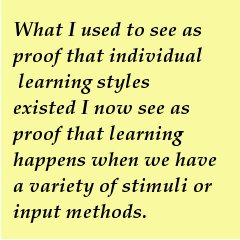I will be facilitating two workshops, essentially identical though different ;) , on integrating technology into secondary school classrooms. Specifically Language Arts, History, and Science.
When it comes to workshops, teachers want practical ideas that they can use in their classrooms so I will be organizing the workshops by practice first and then filling the theory in as we go, as it is needed.
Oh, they are identical but different because one is for English secondary teachers, one for French.
Ideas I have so far:
Digital Storytelling as the basis for integrating tech not only in the language classrooms but in the other classrooms as well
Demonstrating examples using:
- VoiceThread
- Video
- Blogging
- Collaborative creation (using googledocs kind of things)
Here are the workshop descriptions:
Technology as part of the learning process: Specific activities that integrate technology in the Secondary classroom.
In this workshop we will explore specific ways to integrate technology into Secondary Language Arts, History, and Science classrooms. It used to be that technology was an add on, something extra that many of us believed we did not have time for given the reality of rigorous curriculum and time constraints. Now, technology use is part of the curriculum, part of the learning process. We will look at specific ideas that can be used in the classroom – digital storytelling, blogging, voicethread, video, and other collaborative or individual activities – and how they are related to curricular competencies.
The material we cover, as well as ideas for further exploration, will be added to the website Teaching is a Verb – Enseigner, C’est Agir. The website is set up as a blog and I welcome your comments and questions as they can help me to design a workshop that best addresses your needs.
———————-
La technologie et le processus d’apprentissage: des activités spécifiques qui appuient l’intégration de technologie dans la salle de classe secondaire
Il était une fois que la technologie en salle de classe était une activité supplémentaire, quelque chose qu’on faisait si on avait le temps après le ‘vrai travail’ du curriculum. Maintenant, la technologie fait partie du curriculum, du processus de l’apprentissage. Durant cet atelier je vais vous présenter des activités spécifiques que vous pouvez utiliser dans vos salles de classes – le récit numérique, des blogs, VoiceThread, vidéo, et d’autres activités de collaboration et non – et comment ces activités sont liées aux compétences du curriculum.
Le contenu de l’atelier, en plus que des idées pour l’exploration supplémentaire, sera affiché au site web Enseigner, C’est Agir – Teaching is a Verb. En fait, ce site web est un blog alors je vous invite à me laisser vos commentaires ou vos questions, car ils pourraient m’aider à créer un atelier qui répondra plus précisément a vos besoins actuels.
Any ideas for me? Things you think are must haves? Things I should avoid?

